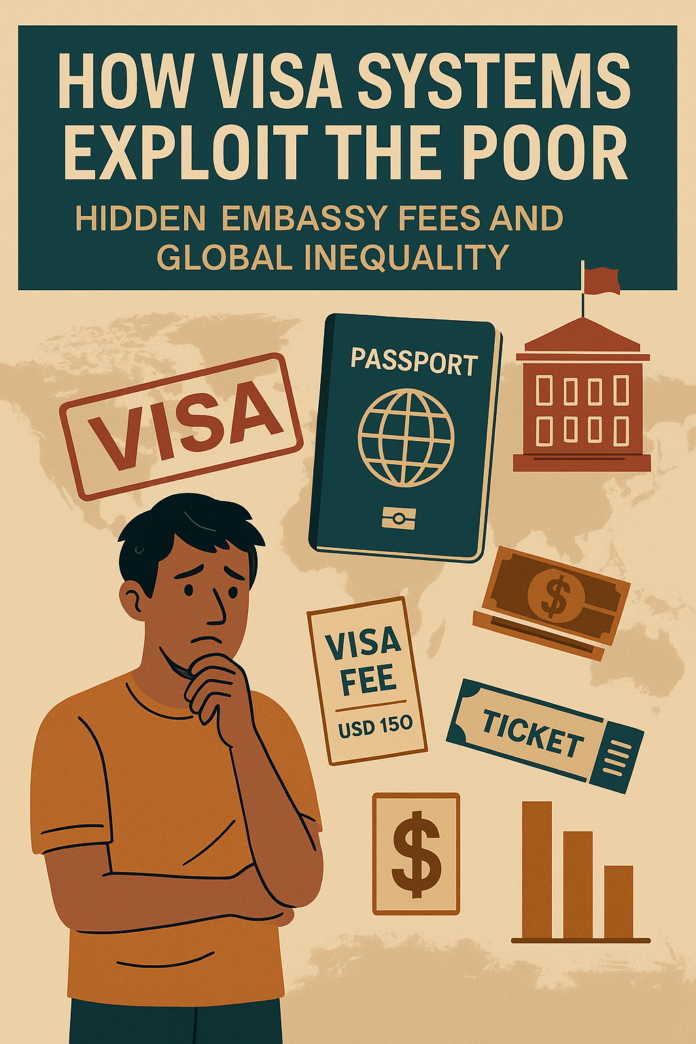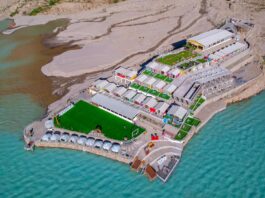Table of contents
- The Unseen Scam: When Diplomacy Favors the Elite
- The Visa Fee Trap: Paying Without a Product
- Bureaucracy Disguised as Policy
- A Two-Tiered System: Politicians vs. Common Citizens
- Third-Party Exploitation: Hidden Costs Multiply
- The Irony of Western Travel Freedom
- A Call for Policy Reform
- Conclusion: Bureaucracy Must Serve, Not Exploit
- References
The Unseen Scam: When Diplomacy Favors the Elite
Global diplomacy is often celebrated as a sophisticated mechanism of international cooperation. However, beneath its polished surface lies a complex, opaque, and heavily bureaucratic system that disadvantages the very people who need opportunity the most—citizens from underdeveloped nations.
For these individuals, simply applying for a visa to visit a developed country can be an ordeal, both financially and emotionally. While foreign embassies and consulates project fairness and order, many of their systems, rules, and procedures end up functioning more like gatekeeping mechanisms—especially for the poor and uneducated.
Let’s break down how.
The Visa Fee Trap: Paying Without a Product
Consider this: The average visa application fee for countries like the United States, United Kingdom, Canada, Australia, New Zealand, and EU nations ranges between $100 to $200 USD. For a family or individual in an underdeveloped country, this can represent an entire month’s income, or more.
Now imagine being denied the visa after paying this fee. No refund. No appeal. Just a silent denial.
To use an analogy: Imagine walking into a café, paying for a cup of coffee, and then being told you won’t be served. No explanation. No refund. It’s absurd—but this is the reality of the modern visa system for many.
According to official statistics from some embassies, millions of visa applications are rejected globally every year, resulting in billions of dollars effectively extracted from poor economies, with no return on investment.
Bureaucracy Disguised as Policy
Embassies justify this non-refundable structure by citing “service fees” or “administrative processing.” Yet the irony is glaring—most embassies are government-run institutions, their employees already salaried through public funds. So why charge the equivalent of a month’s income from a poor applicant with little chance of acceptance?
Moreover, the reasons for visa denial are often vague or unjustified: “insufficient travel history,” “questionable financial flow,” or the infamous “intention to overstay,” even when applicants provide valid bank statements, return tickets, and confirmed accommodations.
This inconsistency points not only to bias but to systemic inefficiency—or worse, deliberate financial exploitation.
A Two-Tiered System: Politicians vs. Common Citizens
The disparity becomes even more offensive when you contrast this treatment with how the elite are handled. Businesspersons and politicians—many of whom have questionable financial ethics—face little to no scrutiny.
Take the example of Pakistan: Several Pakistani politicians are known to own real estate in London and other Western capitals. Questions about how they acquired such wealth abroad are rarely asked, and their visa processes are expedited without the rigorous financial probing that a poor student or worker might endure. Investigative journalism, including work from Transparency International, has repeatedly highlighted this selective enforcement.
Third-Party Exploitation: Hidden Costs Multiply
On top of visa fees, applicants often must:
- Pay for travel insurance (non-refundable if the visa is denied),
- Buy airline tickets in advance (again, non-refundable),
- Pay third-party service fees to agencies handling biometrics and applications, often upwards of $75 USD,
- And cover residence permit fees post-arrival (another €100+ in many European countries).
One of the most egregious examples is the Transit Visa—required even for passengers who are only in the airport for a few hours between flights. These short layovers, often arranged by budget airlines, can become unaffordable or logistically impossible for travelers from poorer nations due to the additional visa requirements.
This system appears more like a profit-generating scheme than a security protocol.
The Irony of Western Travel Freedom
In contrast, citizens of developed countries enjoy unprecedented freedom. Many Western travelers can visit dozens of countries visa-free or obtain visas on arrival. They travel on shoestring budgets, sometimes hitchhiking, sometimes receiving free meals from hospitable locals in the very countries whose citizens must navigate a bureaucratic minefield just to step into a Western airport.
This double standard highlights a profound global inequality—not just economic, but also institutional and diplomatic.
A Call for Policy Reform
It’s time for global institutions to reimagine diplomacy. A few actionable ideas:
- Partial Refunds: Embassies should refund at least 75% of the visa fee upon rejection, retaining a small amount for actual administrative costs.
- Visa-Free Transit: Travelers on short layovers should not need costly transit visas, especially for under 8 hours.
- Means-Based Adjustments: Visa fees should be adjusted relative to the applicant’s country of origin’s GDP or income index.
- Transparency in Rejection: Detailed reasons for visa denial should be shared with applicants to ensure accountability.
Conclusion: Bureaucracy Must Serve, Not Exploit
The world’s diplomatic framework needs to be more humane. In an era where globalization is supposed to bring people closer, bureaucratic walls are growing higher for those who can least afford them.
It is not only unethical—it is unsustainable.
As long as global diplomacy continues to favor the wealthy and powerful while ignoring the dreams of the underprivileged, we are not progressing—we are profiting from inequality.
References
- Transparency International. (2023). Corruption Perceptions Index. https://www.transparency.org
- UK Home Office Visa Statistics. (2022). Visa decision outcomes. https://www.gov.uk/government/collections/migration-statistics
- World Bank. (2023). Poverty and Shared Prosperity Report. https://www.worldbank.org
#VisaInequality #DiplomaticBias #GlobalBureaucracy #DevelopingWorld #TravelJustice #ForeignPolicy #ImmigrationReform




